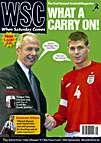 In WSC 208 we asked you all sorts of questions, such as who would win Euro 2004 and your feelings about a range of clubs. Roger Titford crunches the numbers
In WSC 208 we asked you all sorts of questions, such as who would win Euro 2004 and your feelings about a range of clubs. Roger Titford crunches the numbers
Results from the WSC 2004 survey show that readers totally disgraced themselves as prediction pundits. The top three picks to win the tournament – France 44 per cent, Italy 17 per cent and Spain 12 per cent – were all out before the semi-finals. Only three per cent had Greece even as quarter-finalists. In defence of our readership, it must be said that 50 per cent never bet on football and we can see why.
Predictions on the effects of the presence of thousands of England fans were more accurate with 65 per cent going for “small amount of trouble blown out of all proportion” and virtually no one suggesting England would be thrown out of the tournament.
We asked readers in 1997 and again in 2004 whether they had a soft spot, or felt indifference or dislike for a selection of 24 clubs. Table 1 shows the balance of positive and negative opinions for each club. For example 39 per cent of readers had a positive opinion, 13 per cent a negative opinion of Barcelona giving a balance of plus 26 per cent shown in the table and making them readers’ overall favourites.
Given we are asking the same question of many of the same people, we should expect some consistency between the 1997 and 2004 results and indeed that is what we see, with a few notable exceptions. The most positive shift is Arsenal’s, moving from 20th to fifth during the course of Arsène Wenger’s reign. In the opposite direction, one-time underdog darlings Wimbledon manage what must a record-breaking downward image shift for any brand in any market – ever.
Fulham’s rating has plunged as they have risen in the League and Chelsea’s spending spree has found no new friends. Chesterfield’s off-the-pitch troubles have not affected their reputation much and while feelings towards Manchester United have improved slightly there is still some way to go before opinions match those of Red Issue readers. David Beckham’s move has not helped Real Madrid’s favourability.
Table 2 is based on the same data but measures how much impact each club has on readers; that is whether it generates any kind of opinion, positive or negative.
United and Wimbledon have high proportions of dislikers and take the top two spots. Significantly more readers express an opinion about Arsenal (neutrals converted), Chelsea (neutrals antagonised) and the two Spanish clubs (La Liga coverage?) than in 1997. Middlesbrough have plunged in mentions since their near-glory days of ’97 to Hull and Hartlepool levels.
These two tables of comparisons show that our readership’s opinions of various clubs (if you like, the informed, neutral, British football fans’ views) are generally robustly held over the years – but capable of change if something big happens (Wenger, demise of Wimbledon, Spanish football coverage). It also shows we’re rather short of Manchester United supporters.
Elsewhere in our survey, we find that readers’ positive opinions about professional footballers have declined severely since 1995. Then 47 per cent held a positive opinion; now that proportion has declined to only 30 per cent.
The increasing focus on the world game meets some resistance among readers. Compared with five years ago, 47 per cent are more interested in the lower divisions, 43 per cent more interested in non-League football and 38 per cent in the game around the world. And this reflects what is happening at the turnstiles.
Many thanks to all those readers who continue to reply most helpfully to our surveys. Twenty of you will be lucky T-shirt winners.
From WSC 211 September 2004. What was happening this month